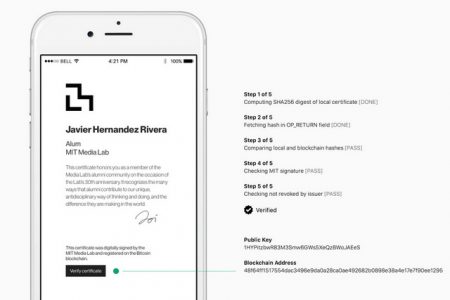Certificates issued on the basis of the blockchain can be used peer-to-peer and verified as authentic.
Learning Machine, a global provider of enterprise software for organizations specializing on higher education, and MIT Media Lab’s Learning Initiative, focused on creative learning, have been developing an open-source project for creating, sharing, and controlling educational credentials based on the blockchain.
People can use blockchain-based certificates to hold and share digital proof of their education and employment. Certificates can be shared directly and the process is as simple as sending a link. The blockchain technology acts as a guarantee that each certificate is authentic, unchanged, and still valid. Learning Machine and MIT Media Lab’s Learning Initiative are planning further releases aimed at making certificates even more useful for real-world adoption: certificate versioning, revocation, cohort issuance, cost reduction, and privacy considerations for encrypting documents that contain highly private information, like academic transcripts.
Chris Jagers, Co-Founder and CEO of Learning Machine, said: “The goal of our collaboration with the MIT Media Lab is to empower individuals with shareable credentials that can be used peer-to-peer and verified as authentic. The current system for sharing official records is slow, complicated, expensive, and broken for everyone in a myriad of ways. The first generation of students to grow up entirely during the Internet age have started applying for college, and many admissions officers can share stories about applicants trying to text photos of their academic records. The expectation, while seemingly humorous, conveys an honest impression about the way things should work. It should be that easy for people to share certified records directly with others and have them trusted as authentic.”
The initiative is seen as the first step in a much broader plan to employ new technologies and approaches to evolve standards that lift the entire ecosystem. The companies combined Learning Machine’s robust track record of forward thinking enterprise software delivered at scale and Media Lab Learning Initiative’s world-class research engineering to create a worthy product.
“Blockchain verification flips the current power arrangement in higher education by giving learners control over their official documents,” said Learning Machine President and COO, Dan Hughes. “Today, most evidence of achievement is bottled up in a proprietary information system or stored unofficially on a piece of paper framed on a wall or lost in a box in the garage. Jailbreaking the credential is about every learner being able to directly see and share verified evidence of what they have achieved. A curated view of one’s achievements, shared at whatever level of granularity is appropriate, puts the learner’s privacy and self-expression on equal footing with institutional demand for proof.”
Learning Machine Cultural Anthropologist, Natalie Smolenski, explained what contribution the technology can make in the sphere of education: “For the past several years, co-curricular transcripts have engendered lots of excitement among educators as a way of highlighting student achievement holistically, including those activities that take place beyond the classroom. This created a new challenge, however: how could any one institution adequately curate all of this activity, much of which occurs beyond its purview? With verified digital credentials, the organizing principle shifts from issuers to the individual. Learners now have the power to curate their own, appropriately tailored, co-curricular transcripts from across all of their verified education and experience. That is the mission at the heart of this project.”
next